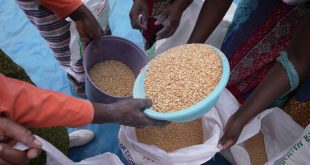SYDNEY and KUALA LUMPUR, Nov 10 (IPS) – The World Financial institution has lastly given up defending its controversial, however influential Doing Enterprise Report (DBR). In August, the Financial institution “paused” publication of the DBR resulting from a “number of irregularities” after its a lot criticized rating system was uncovered as fraudulent.
Apparently, information from 4 nations – China, Azerbaijan, the UAE and Saudi Arabia – was “inappropriately altered“, based on the Wall Road Journal. Publicity of those irregularities was the ultimate straw: now, it’s unsure whether or not the DBR will return after its suspension.
Exposing the lie
After Chief Economist Paul Romer informed the Wall Road Journal two years in the past that he had lost faith within the “integrity” of the DBR, and apologized to Chile for probably politically motivated information manipulation, he was compelled to resign. The Economist commented then, “His resignation may not end the controversy“.
Romer later acquired the so-called Economics Nobel Prize following his resignation. Nearly twenty years in the past, Joseph Stiglitz additionally acquired the Prize after being compelled to resign following variations with US Treasury Secretary Larry Summers following the 1997-1998 Asian monetary disaster.
When Justin Sandefur and Divyanshi Wadhwa of the Middle for International Growth (CGD) uncovered how ostensibly methodological tweaking modified Chile’s and India’s DBR rankings to bolster “market-friendly” Piñera and Modi vis-à-vis their extra centrist opponents. Simeon Djankov, founding father of the Financial institution’s Doing Enterprise index, dismissed the CGD and the 2 authors as “reformed Marxist“.
Doing Enterprise vs SDGs
Djankov insisted that the DBR is concerning the prices of doing enterprise, not “the benefits of running a society“. He contemptuously informed those that criticised the DBR for failing to think about social or environmental impacts, to create their very own “index that claims the advantages of …regulation”.
For the DBR, it didn’t matter if decreasing laws harmed the atmosphere or employment circumstances, or if reducing taxes constrained governmental capability to fund public funding and supply first rate public well being or social safety so long as such “reforms” lowered the prices of doing enterprise.
Singlehandedly, Djankov uncovered the vanity of the Financial institution’s dedication to the Sustainable Growth Objectives (SDGs). By undermining social and environmental dimensions, Djankov uncovered the Financial institution’s precise angle to sustainable improvement.
Therefore, the Financial institution had little selection however to ditch the DBR, which has already completed monumental harm to improvement by encouraging dangerous tax competitors and ‘races to the underside’ with regard to the safety of the atmosphere and labour rights.
Racing to the underside for nothing
Governments search enhancements of their nation’s DBR rating believing that it’ll enhance progress through elevated funding, particularly international direct funding (FDI). Nevertheless, the proof has been disappointing.
For instance, a World Bank Policy Research Working Paper discovered that, “on common, nations that undertake large-scale reforms relative to different nations don’t essentially appeal to higher inflows”. For growing nations, it discovered an insignificant statistical relationship. Another study concluded, “the varied research don’t present steerage on which of the wide selection of attainable reforms are most strongly correlated with elevated progress”.
Such rating competitors has inspired debilitating investor-friendly authorities behaviour. The index has grow to be a instrument for governments to formulate, consider and legitimize their financial insurance policies. Some now game the system to notch up their nations’ rating with primarily beauty reforms.
Indonesia’s latest “Omnibus Bill” ostensibly for job creation consists of many market-friendly reforms that will most definitely increase Indonesia’s DBR rating. The invoice, from a authorities more and more influenced by the Financial institution, is now broadly criticised for closely favouring highly effective enterprise pursuits on the expense of staff, human rights and the atmosphere.
Agrarian counter-revolution
Ditching the DBR could also be a great begin, however is way from sufficient. The Financial institution should additionally finish different related ‘ideologically pushed’ workout routines, equivalent to its Enabling the Enterprise of Agriculture (EBA) and Investing Throughout Borders (IAB) indicators, which prioritise FDI, usually on the expense of some SDGs.
The Financial institution’s EBA indicators project is an extension of its Benchmarking the Business of Agriculture (BBA) programme, first launched in 2013. BBA, partly based mostly on the DBI methodology, was created after the G8 asked the Bank in 2012 to develop such an index for the G8’s controversial New Alliance for Food Security and Nutrition programme.
The Financial institution claimed, “The symptoms present a tangible measure of progress and determine regulatory obstacles to market integration and entrepreneurship in agriculture”, resulting in a extra fashionable industrial agriculture sector. Private agribusiness investors will be the main beneficiaries of its proposed land insurance policies and environmental safety deregulation.
However the Financial institution doesn’t hassle to clarify how farmers, particularly smallholder or peasant farmers, will profit from the proposed reforms or from large-scale industrial agriculture. Our Land; Our Business highlighted that the EBA will encourage company land grabs and undermine smallholder farmers who produce 80% of meals consumed within the growing world.
In January 2017, over 158 organizations and teachers from around the globe denounced the EBA to the WB President and its 5 Western donors (USAID, DFID, DANIDA, the Netherlands, and the Gates Basis), demanding its immediate end.
In response, the Bank made some beauty adjustments and dropped its controversial land indicator. Nevertheless, its newest (2019) EBA still reflects its sturdy bias for industrial agricultural inputs and mono-cropping, undermining meals safety, sustainability in addition to customary land holdings.
Favouring International Direct Funding
The Financial institution’s Worldwide Finance Company (IFC) launched its Investing Throughout Borders (IAB) indicators in 2010. Closely influenced by Hernando de Soto, the IAB indicators had been designed to enrich the Financial institution’s DB indicators.
The IAB indicators declare to assist speed up financial progress by giving primacy to FDI as a driver for job creation, expertise switch, upgrading expertise, fostering competitors and monetary consolidation. In truth, IAB indicators encourage frameworks that limit benefits for host nations moreover enhancing the dangerous results of cross-border funding offers.
The indicators also violate the letter and spirit of the IFC’s Efficiency Requirements for Environmental and Social Sustainability; Rules for Accountable Agricultural Funding respecting rights, livelihoods and sources; Voluntary Tips on the Accountable Governance of Tenure of Land, Fisheries and Forests; and varied different worldwide devices.
One dimension by no means matches all
The rise and fall of the DBR expose the hazards of utilizing and exaggerating the importance of standardised rankings for very totally different nations and enterprise environments. An IC is often complicated and tough to scale back to some key indicators, not to mention a significant composite index.
Reforming solely sure elements of enterprise regulation due to the affect of Doing Enterprise can’t probably be optimum, particularly when authorities capability is constrained. Academic literature reviews conclude, “whereas there’s empirical proof that institutional reform can promote progress, it’s much less clear which reforms matter most, easy methods to prioritise attainable IC reforms, and what sorts of institutional frameworks and capabilities are wanted”.
Progress drivers and constraints are very context particular, so reform priorities must also be context particular. Subsequently, a one-size-fits-all strategy to measuring and understanding complicated funding atmosphere points may be very problematic, particularly one based mostly on the pursuits and priorities of explicit establishments and powers.
The Financial institution ought to cease doing hurt by concentrating on its unique mandate of intermediating finance on the lowest attainable value for sustainable improvement, reduction and restoration in our extraordinary occasions. It ought to cease deceptive the world, particularly growing nations, with its extremely biased supposed information merchandise.
Follow @IPSNewsUNBureau
Follow IPS New UN Bureau on Instagram
© Inter Press Service (2020) — All Rights ReservedOriginal source: Inter Press Service
 Top Naija News: Nigerian News, Breaking News Nigeria and World News Top Naija News is a daily news publication in Nigeria, delivering the latest breaking news in Nigeria and around the world.
Top Naija News: Nigerian News, Breaking News Nigeria and World News Top Naija News is a daily news publication in Nigeria, delivering the latest breaking news in Nigeria and around the world.



